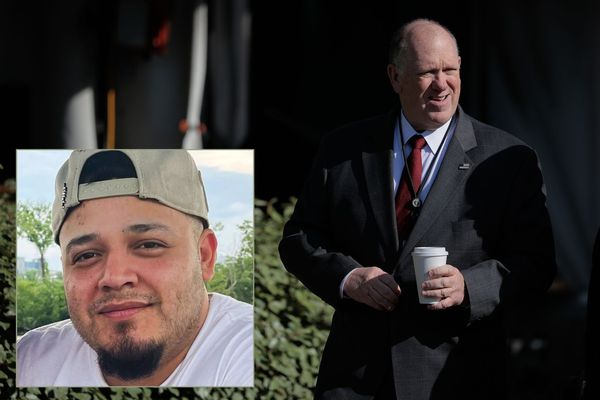
The Australian Human Rights Commission is facing pressure from staff over what they claim is an inadequate response to Israel’s war in Gaza.
Staff across eight of the commission’s teams – at least 24 of the 122 staff employed – wrote to the commission’s president, Rosalind Croucher, last week. The letter expressed “frustration at the commission’s failure to fulfil its mandate as an accredited national human rights institution in regard to Israeli war crimes and crimes against humanity perpetrated against Palestinians in Gaza and the West Bank”.
Staff were concerned the language used in public statements issued about the conflict since 7 October was softer than an opinion piece by the human rights commissioner, Lorraine Finlay, in 2022 about the war in Ukraine.
In that piece Finlay said: “The stark reality is that if human rights in Ukraine merely exist at the whim of a ruthless autocrat from a foreign land, then the foundations on which all our human rights rest are profoundly weakened.
“Ukraine is not just someone else’s problem. This is a moment that needs to unite us all,” Finlay wrote at the time.
Staff were also concerned the commission’s statements on Israel and Palestine were weaker compared with statements issued by international human rights organisations.
The commission’s most recent statement, about the International Court of Justice ruling on Israel’s actions in Gaza, expressed concern about “the appalling suffering and loss of life and the urgent and deteriorating humanitarian circumstances” in Gaza and the West Bank. It called for leaders “to use whatever diplomatic means available to end the violations of international law, to secure a ceasefire and to alleviate the suffering of innocent civilians”.
But some staff have called for the commission to take a number of actions, including the use of stronger language on Israel; calling for an immediate, permanent ceasefire as well as an end to occupations; and ensuring Australia upholds its obligations under the genocide convention in light of the International Court of Justice ruling that Israel is plausibly committing genocide in Gaza, a claim Israel has repeatedly denied.
In her response this week, Croucher told the group that the commissioners had considered the letter and acknowledged staff concerns around the conflict.
“We acknowledge that the conflict between Israel and Palestine is causing a great deal of pain for many in Australia, and it is understandable that people feel strongly about it,” she said.
“There are a diversity of experiences and perspectives among commission staff, as there are within the community.”
But Croucher said the commission’s focus is “primarily on human rights within Australia” and, as a result, meetings with government and community leaders had been focused on what the commission could do to de-escalate tensions within and between Australian communities.
“The commission continues to listen to, consult with and support communities in Australia that are affected by the conflict. We are also working with the federal government under the national anti-racism framework to address antisemitism, Islamophobia, racial hatred and racial discrimination.”
Croucher said regular public statements had been made, including one on the ICJ ruling, a letter to the prime minister and an opinion piece in Guardian Australia, and the commission had hosted the UN special rapporteur, Francesca Albanese.
“The commission acknowledges that some would like to have seen it make statements that more strongly reflect their own respective positions,” Croucher said. “However, the commission has consistently called for respect for human rights – including the right to freedom of assembly – the protection of civilians, provision of humanitarian aid to the people of Gaza and the return of all civilian hostages.
“This is in keeping with statements by the Office of the High Commission for Human Rights and with other national human rights institutions.”
Croucher claimed it was not part of the commission’s functions to inquire and report on the Australian government’s obligations under the genocide convention.
She told the staff that while she was concerned they felt they could not raise the issues through internal channels, she would not be communicating with them via the encrypted email address through which they contacted her as it was not an “official channel” for commission communication.
A spokesperson for the commission declined to answer questions about staffing matters, but reiterated that the commission’s mandate was focused primarily on human rights within Australia.
“We have made regular public statements about the events unfolding in Israel and Palestine. We are also continuing to consult with and support communities in Australia that are affected by the conflict.”
The Greens’ justice spokesperson, David Shoebridge, said the commission should be deeply concerned that their own staff believe an open letter, with their identities protected, was needed to get a human rights issue taken seriously.
“A narrowly legalistic approach which seeks to artificially exclude the conflict from consideration is a breach of the commission’s mandate to be a leader on human rights for the Australian people,” he said.
The matter will likely be raised when the commission appears before Senate estimates next week.
Do you know more? Contact josh.taylor@theguardian.com







